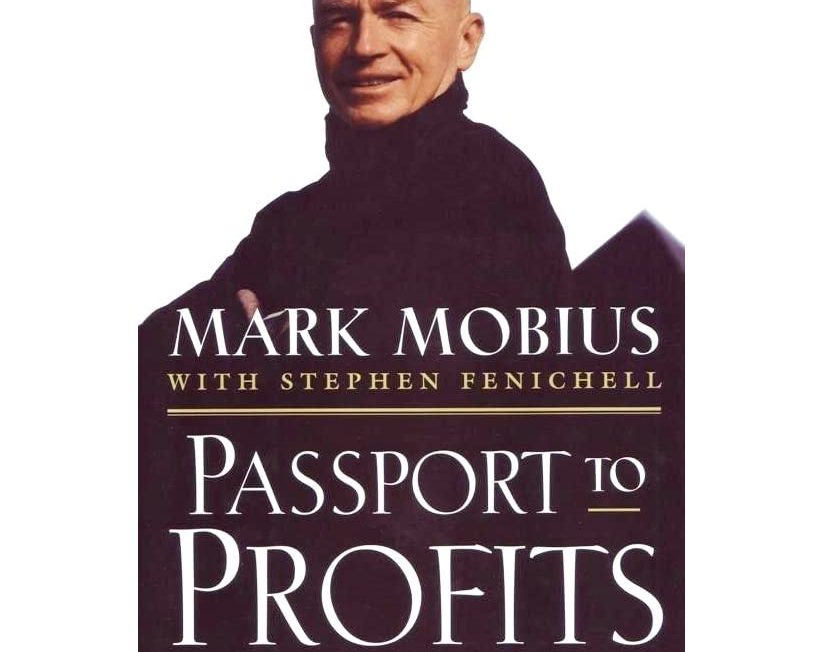Dear Friends,
As the readers of my blog will probably realize, I have spent the better part of the last two years on the road. Either it has been the travel between Pakistan and London, or travels for meeting clients both within Pakistan and globally. One good thing about these travels is that it gives ample time to read books (and write blogs). I am a bad sleeper and PIA is light on entertainment options. Last week, I was in Lahore for a couple of talks at COLABS and at LUMS. The journey back was 18 hours; a bus ride from Lahore to Islamabad and a connecting flight from there to back home in London. I had sneaked out two books from my father in law’s library; Jim Collins’ Good to Great (click here) and Mark Mobius’s Passport to Profits: Why the next Investment windfalls will be found abroad – and how to grab your share (click here).
Mark Mobius is a legendary figure, especially in emerging markets. Last week, London Stock Exchange celebrated the 30th anniversary of the Templeton Emerging Markets Investment Trust, one of the funds which were managed by him. I have never met him. I have always been inspired by him and by his mentor, John Templeton. I quoted Templeton in my University application essays 20 years ago. Templeton was also a Rhodes Scholar and has a college named after him at my alma mater, Oxford. I was supposed to attend a book signing event of Mark Mobius’ latest book on ESG but duty required me to travel out of London. Mark Mobius’s book is a very insightful and interesting read on his experiences of investing during the 90’s. This was the time when most emerging markets were opening up to global capital for the first time. Pakistan allowed foreign investment in 1992. Mobius has laid down 84 rules of investments in this book, which I thought were worth sharing via this “special blog post”.
As some of you will be aware, my colleagues, Aimun, Hammad and Taha at KASB have launched an Investment Competition for students. KASB Trading Titans (click here) is an inter-university competition, which will run for one quarter (Oct-end December). We have received massive interest. We have participants from IBA, KSBL, IoBM, Iqra and LUMS. Interestingly, 80% of the participants are from Karachi. Mobius’s Rules on investment (and his book) should be useful to the participants of KASB’s Trading Titans. I got my colleague Faysal to write them down for this blog.
Here are Mobius’s Rules:
l: Your best protection is diversification.
2: Taking risks is what you get paid for.
3: If you want to gain exposure to the world’s fastest-growing economies, you’ve got to take the plunge into emerging markets.
4: High volatility is a characteristic of all markets—even the more mature ones.
5: If you factor emotion out of the equation, and base your strategy on long-term fundamentals, you can win when markets fall and when markets rise.
6: Wait five years, and call me in the morning.
7: Bad times can be good times.
8: Lies can be as revealing as pure, honest truth—provided you know what cues to be looking and listening for.
9: By the time most of the data prepared by multinational institutions and governments become available, it’s already been factored into the stock price.
10: Buy “good” stocks at “bad” times, and “bad” stocks at “good” times.
11: Times that people think are bad are often good.
12: Stocks that people think are bad are often good.
13: Countries that make it easy for travelers to enter tend to be friendly to foreign investment.
14: The quality of management is paramount.
15: Buy wet (liquid) stocks in wet (liquid) countries, not dry (illiquid) stocks in dry (illiquid) countries.
16: Patience is more than its own (just) reward.
17: Long-term planning pays.
18: The time of maximum pessimism is the best time to buy.
19: The time of maximum optimism is the best time to sell.
20: If you can see the light at the end of the tunnel, it’s too late to buy (or sell).
21: You earn dividends by discounting a market’s “emotional quotient” (E.Q.).
22: Buy stocks whose prices are going down, not up.
23: If a market is down 20 percent or more from a recent peak and value can be seen, start loading up.
24: Time heals most ills.
25: Privatization primes the pump.
26: Low-tax economies tend to be good places to place your investment dollars.
27: Success as a global investor is closely linked to optimism.
28: Reading local papers and watching local newscasts can provide valuable insights unavailable anywhere else into the mentality of local markets.
29: Clothes may not make the man, but they can provide clues to the personality.
30: Low telecom penetration rates represent high potential growth.
31: Always inquire about the probity and honesty of management before anything else.
32: Keep on the lookout for industries that once were heavily regulated and are now being deregulated.
33: Don’t be put to sleep by utilities. Be woken up by them!
34: If the net asset value (NAV) divided by the number of shares gives you a dollar figure higher than the share price, then you could consider it an undervalued stock.
35: Never, ever invest in a country without checking out its stock exchange first.
36: The best way to determine transparency is to inquire about a central share registry. If there isn’t one, in most cases a market can’t be considered fully transparent’
37: Look for companies not yet privatized, or fully privatized.
38: Look for second-tier companies with small market caps and big growth potential.
39: Wait for the panic. Then, calmly, buy.
40: In the perception gap between emotion and reason you’ll find your buy window.
41: When buying shares in foreign companies it’s important to read the fine print, and know the quality of rights conferred by ownership of the shares.
42: Often the macro picture contradicts the micro picture.
43: By correcting the gap between the macro and micro views, you can get a jump ahead of the crowd.
44: When getting in at close to Ground Zero anywhere, the first thing to look for is: a viable stock exchange.
45: Take a good, hard look at your portfolio. Find all the stocks that have gone up 100 percent or more in one year or less, where the earnings have not risen as much, and the five-year projection is not good. And consider dumping them.
46: You don’t maintain high performance by holding on to old blue chips that are no longer blue.
47: Find the next batch of blue chips before they turn blue.
48: In a big country, it takes time for new ideas to be absorbed to the farthest corners, to congeal and permeate the cultural permafrost.
49: A bad attitude is a major red flag. It’s meant to turn you off. Let it.
50: A strictly “objective” or technical analysis of a company’s situation can be misleading. A visit on the ground can make a difference.
51: When investing in any country, it’s important to assess its cultural characteristics.
52: In case of fire, maintaining a viable exit strategy is critical to not getting burned.
53: When scrutinizing a company as a potential investment’ carefully inspect the company by-laws for the prospect of share dilution—one of the easiest moves in the age-old game of “fleecing the minority shareholders.”
54: A divided management can be a good thing, as long as the people in charge can figure out how to play both sides against the middle.
55: As things settle down, returns settle down with them.
56: When you tap into an attitude in any country that says “we’re number one, we’re the best, no one can beat us”. That’s the right time and the right country to SELL.
57: When everyone else is dying to get in, get out.
58: When everyone else is screaming to get out, get in.
59: If a broker starts giving you the hard sell, never buy.
60: The best time to buy is when everyone else is screaming that there’s blood in the streets.
61: In times of crisis, people on the ground start coming to their senses.
62: Easy times make people go soft. Hard times get people going.
63: What goes down usually goes back up, if you’re willing to be patient, and don’t hit the panic button.
64: Bagging baggage is the first step to freedom.
65: The problem with recoveries is that they don’t make good copy.
66: Market meltdowns make headlines. Market recoveries make money.
67: A liquid stock market is one that’s easy to get out of, not just easy to get in.
68: After bagging baggage, the most important thing for management is an ability to listen—particularly when it comes to analyzing their own mistakes.
69: When your broker says “no-brainer,” don’t forget you’ve got a brain.
70: You’ve sometimes got to do worse than the market index in order to beat the index in the future.
71: If you watch a bank like a hawk, you’ll see in the patterns of their lending practices a blueprint of the macro picture.
72: The first country to get hit, and hit hard, is typically the first one to recover.
73: At times of great stress, rumors are reliable keys to popular sentiment.
74: When the ordinary run of buyers gets spooked, that’s the time to step up to the plate and start putting your money down on the table.
75: Only when everyone else is up on the windowsills preparing to jump do things for me start to get interesting.
76: If the whole world is down on a country for exaggerated, short-term reasons shift it from a hold to a buy.
77: The surest sign of the instability of a currency is the existence of a thriving black market. Only when the street rate and the official rate are one and the same can a country’s currency be considered even remotely healthy.
78: Even if the denials to a rumor are true, they’re often only temporary. If you buy or sell on the basis of confirmed and investigated rumor, sooner or later the price will often reflect the reality.
79: The mere prospect of competition down the road will force a slumbering company to wake up and smell the coffee.
80: It nearly always pays to go with the locals.
81: By the time everyone and his brother believed that it’s the right time to invest; the right time will have long since come and gone
82: When looking at the management of companies in countries where the business climate is complex and difficult. Locally trained managers tend to make a better fit with the local environment.
83: Political uncertainty—like any other form of uncertainty can be your green light to move into a market. Uncertainty depresses stock prices. if you have faith in your own crystal ball—or, better yet, your own independent analysis—an uncertain atmosphere can be just the break that you’ve been looking for to pick up large-cap, blue-chip stocks that otherwise would too expensive to even consider.
84: Once uncertainty becomes a certainty, and anyone with two nickels to rub together can with accuracy predict the likely outcome of an event, that beautiful risk premium will have evaporated in a puff of smoke.
Lastly, it was wonderful to read this message in the book.
I am, yours truly,Ali Farid Khwaja
Managing Director
Khadim Ali Shah Bukhari Securities
* This is not research material and there is no investment recommendation in this blog. These are my personal views.


1
../../../../../../../../../../etc/passwd
/etc/passwd
windowswin.ini
WEB-INF/web.xml
..%2F..%2F..%2F..%2F..%2F..%2F..%2F..%2F..%2F..%2Fetc%2Fpasswd%00.jpg
../..//../..//../..//../..//../..//../..//../..//../..//etc/passwd
/WEB-INF/web.xml
…………….windowswin.ini
WEB-INF\web.xml